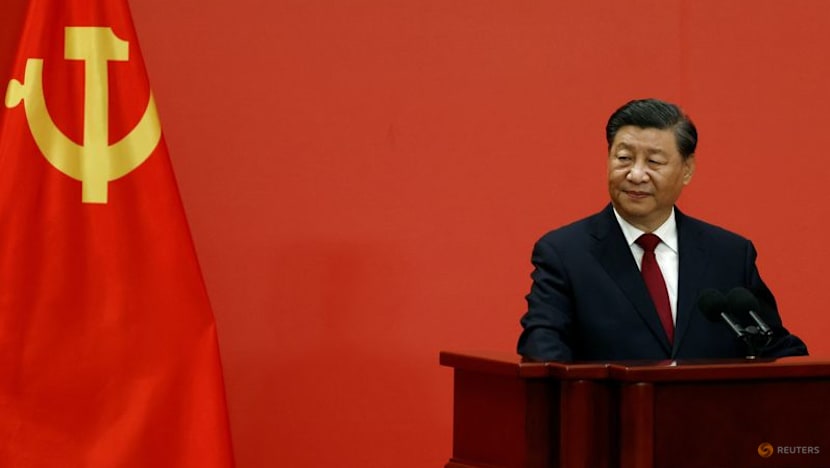Analysis: China finally sets dates for reform-focused plenum, no sea change expected under President Xi
China watchers are looking for hints on the long-term strategy of the world’s second-largest economy. But analysts say surprises are unlikely, as President Xi Jinping remains firmly at the helm.


This audio is generated by an AI tool.
SINGAPORE: Economic reforms and hints on policy direction amid a troubled geopolitical landscape are being anticipated when China’s ruling Communist Party convenes its much-awaited third plenum from Jul 15-18, though analysts are not expecting sea change with President Xi Jinping firmly at the helm for the 11th year.
The third plenum - often referred to as san zhong quan hui in Mandarin - refers to the third plenary session of the Chinese Communist Party (CCP) Central Committee, which typically holds seven such meetings in between each five-year term.
The reform-focused party meeting is closely watched for announcements on the long-term direction and development of the world’s second-largest economy.
Analysts expect economic discussions to dominate proceedings as policymakers work to keep the Chinese growth engines running through a host of domestic and external speedbumps.
A high-tech push, reducing local protectionism and advancing fiscal reforms are set to be among the priorities, noted Mr Neil Thomas, a fellow at the Asia Society Policy Institute’s Center for China Analysis.
“These have been the themes of several major speeches delivered by Xi Jinping at important political events since the first mention of this plenum's theme of 'further comprehensively deepening reforms' at the Central Economic Work Conference last December,” he told CNA.
Dr Benjamin Ho, an assistant professor at the S Rajaratnam School of International Studies’ China Programme, expects topics such as the state of the economy, the need to guard against Western subversion, and national security to be high on the agenda.
While addressing economic issues is likely to top the agenda at the third plenum, any moves made are not likely to be “very substantial”, Associate Professor Alfred Wu at Singapore’s Lee Kuan Yew School of Public Policy (LKYSPP) told CNA.
He added that observers often have an “illusion” of the “groundbreaking impact” of the third plenum, referencing the sweeping reforms announced by the late Deng Xiaoping in 1978.
“It’s the same leader for 11 years now … people cannot actually expect that (Xi) will criticise his own policies.”
Related:
DECIDING ON THE DATES
The third plenum is widely seen as a platform for the CCP to set the economic strategy for the next five to 10 years and is often regarded as the most important of the seven party gatherings during the central committee’s five-year cycle.
It also carries historical heft. In December 1978, then paramount leader Deng used the high-level gathering to announce economic reforms, notably opening up the world’s second-largest economy to private and foreign capital.
The pronouncement came just a month after Deng’s historic visit to Singapore, where he met then-Prime Minister Lee Kuan Yew and other senior leaders and witnessed the country’s rapid development. He was reportedly impressed by the city-state’s social order and management, notably remarking on them during his 1992 Southern Tour.
In November 2013 the central committee at a third plenum vowed to “let the market take the decisive role in allocating resources” in a clear indication of a freer economy.
The July dates are a break with China’s political calendar, as third plenums over the past four decades have typically been held in October or November, after the CCP’s twice-a-decade party congress.
Another exception was the 2018 edition. It was atypically held in February, where the central committee urged the party to "unite closely" around it with Mr Xi at the "core", and proposed the removal of the two-term presidential term limit.
According to Chinese state news agency Xinhua, the decision on the dates was announced on Thursday (Jun 27) at a meeting of the Politburo - the CCP’s second-highest decision-making body behind the apex Politburo Standing Committee.
President Xi is under no compulsion to follow past trends, said RSIS’ Asst Prof Ho. “The way I see it, plenums like these provide the platform for the political leadership to set the broad parameters and priorities, and possibly to make adjustments to past policies,” he added.
Assoc Prof Wu noted that economic action aside, observers will be watching whether a new Politburo member could be announced at the third plenum. The body shrank to 24 members from 25 at the 2022 half-a-decade party congress when then-Vice Premier Sun Chunlan retired.
“Generally speaking, decision-making bodies have an odd number of members for symbolic voting purposes,” Assoc Prof Wu pointed out.
WHAT’S IN STORE?
When announcing on Apr 30 that the third plenum would be held in the month of July, the Politburo also noted that the party meeting would “primarily study issues concerning further comprehensively deepening reform and advancing Chinese modernisation”.
The Apr 30 meeting did not specify the plenum's agenda but emphasised the adoption of proactive fiscal policies, utilisation of foreign capital, and development of "new quality productive forces" to mitigate risks in critical areas amid intense global competition, reported the South China Morning Post (SCMP).
“New quality productive forces” or “xin zhi sheng chan li” in Chinese was coined by Mr Xi in September last year, during an inspection and research trip to China’s northeastern rust belt. At the time, state media translated it as “new productive forces”, with the word “quality” only inserted in recent months.
Analysts have said the term essentially refers to innovation in advanced sectors such as artificial intelligence and big data. China has been engaged in a high-tech push as it looks to boost an economy weighed down by a protracted property downturn, uneven consumer spending and de-risking strategies by rival superpower the United States.
The clearest hints yet as to the third plenum’s agenda emerged on Wednesday (Jun 26) through a high-profile commentary published in People’s Daily, the official newspaper of the CCP. The article was authored by Ren Zhongping, a byline understood to be used by People’s Daily to set the official tone on major policies and current affairs.
According to the article, which made the newspaper’s front page, attention will be placed on the "reform of the economic system", which includes "upholding and developing the basic economic system" and "establishing a high-level socialist market economy by 2035”.
President Xi had already dangled hints of his aims in late May, during a visit to the city of Jinan in eastern Shandong province where he chaired a meeting with business representatives and academics.
“We must resolutely eliminate the ideological concepts and institutional shortcomings that hinder the advancement of Chinese-style modernisation,” the Chinese supremo said on May 23 as reported by SCMP.
“We must pursue an approach that is both goal- and problem-oriented to solve problems … focus on deep-seated institutional obstacles and structural issues.”
Topics such as reforming the electric power system, enhancing productivity and market reforms for land were discussed, according to local media reports.
While acknowledging the focus points raised in the Shandong meeting, Assoc Prof Wu from LKYSPP is sceptical about whether the announcements made during the third plenum will be sufficient to reverse the current economic downturn.
“China’s policy tools to restore the economy and go back to the previous status are very limited,” he said, referring to factors like the strained ties between China and the US.
He added that there have already been many reforms released by Beijing since abruptly lifting its strict zero-COVID policy in early 2023. “It has already been one and a half years … China’s economy is still going downward.”
A new party watchdog overseeing China’s vast 400,000 trillion yuan holdings in banking, insurance and securities assets was carved out last year as part of a broader economic reshuffle.
More recently in mid-May this year, China unveiled sweeping measures to shore up its troubled property market - reducing minimum mortgage rates and down payments and directing local governments to buy unsold homes.
While Mr Thomas from the Asia Society Policy Institute is sceptical about the third plenum producing transformative policy shifts, he suggests there could still be some positive swings.
“It could still deliver some upside surprises to address China's economic struggles, as the reversal of zero-COVID policies suggests that Xi can change his mind when it is in his political interest to do so.”
FORMALISING DISMISSALS
China watchers will also be looking out at the third plenum for further details into the dismissals of former high-profile figures.
Xinhua reported on Jun 27 that former defence minister Li Shangfu and his predecessor Wei Fenghe had been expelled from the CCP for "serious violations of discipline", a euphemism for corruption.
Li was suspected of receiving "huge sums of money" in bribes as well as bribing others. An investigation found he "did not fulfil political responsibilities" and "sought improper benefits in personnel arrangements for himself and others", the report said, citing the CCP’s central committee which ordered the investigation.
This is the first time China has explicitly confirmed that Li was under investigation, as well as details of the nature of his crimes.

Similarly, an investigation launched into Wei last September found that he had accepted "a huge amount of money and valuables" in bribes and "helped others gain improper benefits in personnel arrangements", Xinhua stated in a separate report.
Li and Wei were also found to have other unspecified violations, the reports said without elaborating.
The decision to oust both men from the CCP will be confirmed during the third plenum when removals from the central committee will be formally announced.
Another name to watch is former foreign minister Qin Gang, who still remains on the CCP central committee. Qin was removed from his post in July 2023 after just seven months amid speculation he had an extramarital affair that potentially compromised national security, making him the shortest-serving foreign minister in the country's modern history.
Two other senior Chinese officials are also on the radar - former PLA Rocket Force commander Li Yuchao and agriculture minister Tang Renjian. Both are reportedly being investigated for corruption but remain members of the central committee.
The 376-strong central committee comprises both full as well as alternate members, with no voting rights. Li is an alternate member while Tang is a full member.
Mr Thomas from the Asia Society Policy Institute highlighted CCP party rules that state a plenum must ratify any decision to eject a member of the central committee.
“This plenum provides Xi the chance to clean house in the central committee.”
Additional reporting by Wong Woon Shin
















